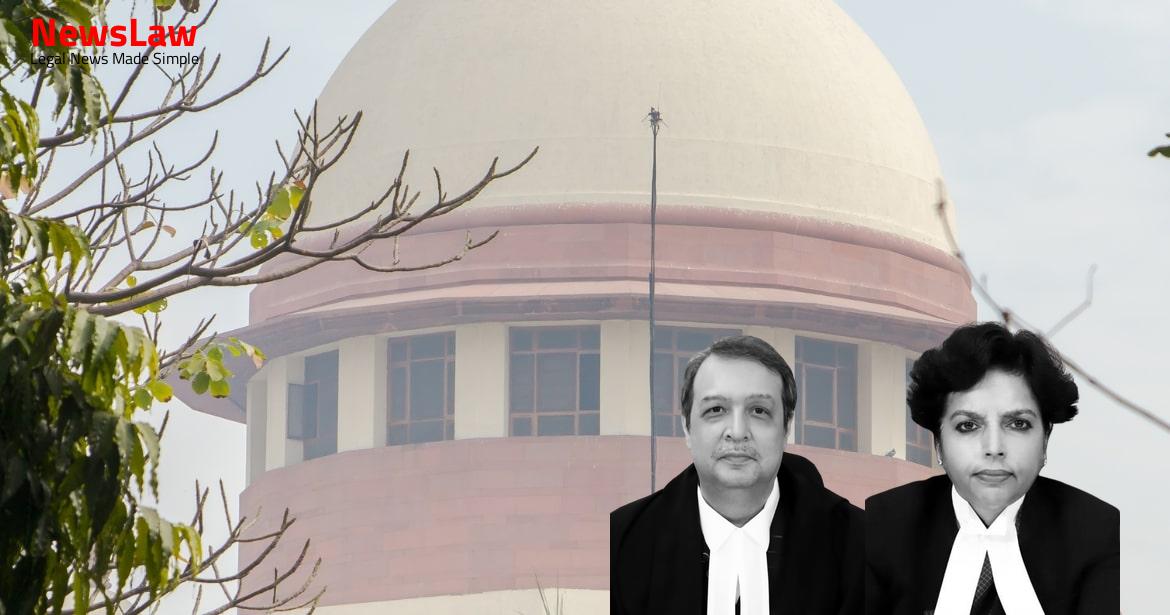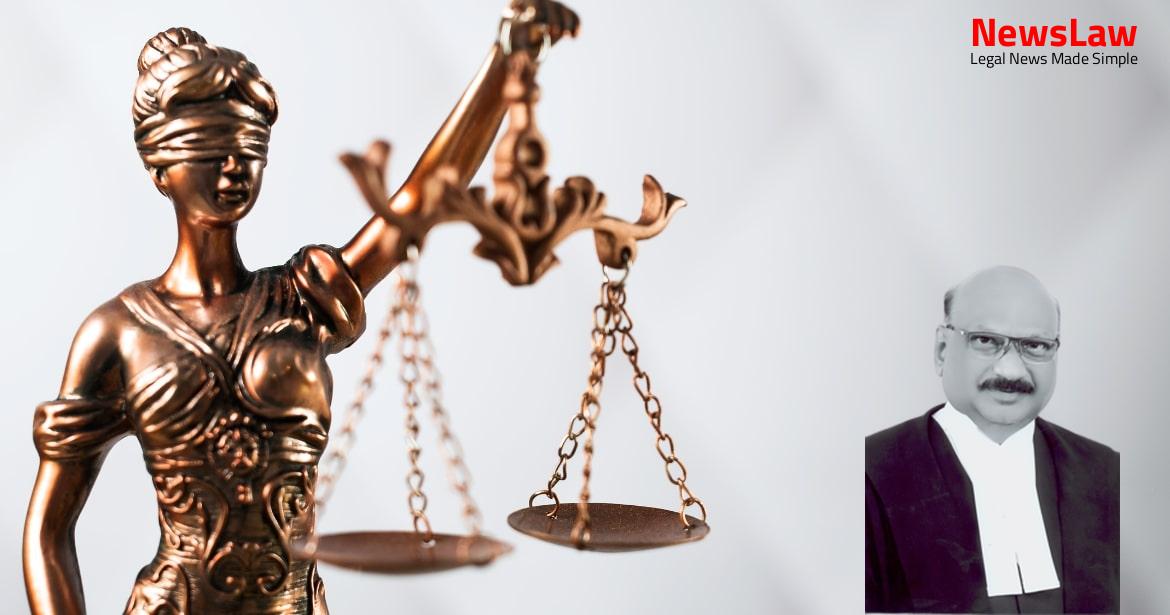On 7 November, 2007, the respondent was detailed for ‘C’ shift duty from 21:00 hours on 7 November, 2007 to 05:00 hours on 8 November, 2007 at Alif Nagar Scrap yard situated in the Garden Reach area of the Kolkata Port.
Also Read: https://newslaw.in/case-type/criminal/alleged-misuse-of-official-position-courts-legal-analysis/
After examining the evidence and the defence of the respondent, the Inquiry Officer held that both the charges framed against the respondent were duly proved. Rejecting the plea taken by the respondent that the FIR had recorded the occurrence of the offence at 1530 hours on 8 November, 2007 which indicated that the theft had not taken place during his duty hours, the Disciplinary Authority held thus: 6. Dissatisfied by the order passed by the Revisional Authority upholding the orders of the Disciplinary Authority and the Appellate Authority, the respondent filed a writ petition in the High Court of Calcutta, registered as WP No.14102 (W) of 2009.
The aforesaid order was challenged by the appellants – Union of India in two sets of appeals (FMA No.679 of 2019 and FMA 680 of 2019), that were disposed of by the Division Bench, vide the impugned judgment dated 9 September, 2021 whereby, the decision of the learned Single Judge of substituting the punishment of dismissal imposed on the respondent with one of compulsory retirement, was quashed and set aside. The respondent has also preferred Petitions for Special Leave to appeal being aggrieved by the directions issued by the High Court calling upon the Disciplinary Authority to issue a fresh order of punishment qua him upon reinstatement on a plea that there was no occasion for the Division Bench to have interfered with the order passed by the learned Single Judge whereby the punishment of removal from service had been set aside and the respondent was directed to be compulsorily retired from service. Union of India and Others ; that the High Court while exercising the powers vested in it under judicial review, ought not to have stepped into the shoes of the Appellate Authority and reappreciated the evidence to arrive at independent findings on the evidence adduced; that no grievance was raised by the respondent that the rules of natural justice had been violated or the inquiry had not been conducted in a proper manner or that the findings arrived at by the Disciplinary Authority were based on no evidence. Bidyabhushan Mohapatra, it was contended that keeping in mind the gravity of the established misconduct, the Disciplinary Authority has the power to impose a punishment on the delinquent officer and such a punishment is not open for review by the High Court under Article 226 of the Constitution of India. Ranjan Mukherjee, learned counsel for the respondent is that the learned Single Judge having directed reinstatement of the respondent with full back wages, the Division Bench was not justified in passing an order directing that a fresh order be passed by the Disciplinary Authority commensurate to the negligence and dereliction of duty on the part of the respondent. The point that arises for our consideration is whether in the given facts of the case, the learned Single Judge and the Division Bench ought to have interfered with the punishment imposed on the respondent by the Disciplinary Authority and upheld by the Appellate Authority as also by the Revisional Authority. Therefore, courts will not interfere with findings of fact recorded in departmental enquiries, except where such findings are based on no evidence or where they are clearly perverse.
Laying down the broad parameters within which the High Court ought to exercise its powers under Article 226/227 of the Constitution of India and matters relating to disciplinary proceedings, a two Judge Bench of this Court in Union of India and Others v. A Constitution Bench of this Court in State of Orissa and Others (supra) held that if the order of dismissal is based on findings that establish the prima facie guilt of great delinquency of the respondent, then the High Court cannot direct reconsideration of the punishment imposed.
On finding the evidence to be adequate and reliable during the departmental inquiry, the Disciplinary Authority has the discretion to impose appropriate punishment on the delinquent employee keeping in mind the gravity of the misconduct. However, in exercise of powers of judicial review, the High Court or for that matter, the Tribunal cannot ordinarily reappreciate the evidence to arrive at its own conclusion in respect of the penalty imposed unless and until the punishment imposed is so disproportionate to the offence that it would shock the conscience of the High Court/Tribunal or is found to be flawed for other reasons, as enumerated in P. The contention of the respondent that the FIR registered against him mentioned the time of the occurrence as 15:30 hours on 8 November, 2007, when he was not on duty, was also analyzed in depth by the Disciplinary Authority, who referred to the fact that the FIR was lodged suo moto by the West Port Police Station on the basis of a complaint submitted by the Office-Incharge of the Police Station who had recovered the copper wires loaded in a commercial vehicle which was brought to the police station and kept at the police station compound.
Noting the discrepancies in the FIR which were in contradiction with the depositions of PW1, PW2 and PW8 who had stated that the information of the theft was received long before 22:00 hours on 8 November, 2007, the Disciplinary Authority discarded the version of the respondent as unacceptable and went on to hold that the evidence fairly established that the theft of the copper wires had occurred in the intervening night of 7 /8 November, 2007, during the duty hours of the respondent.
However, the learned Single Judge overturned the order of dismissal from service and converted the same to compulsory retirement on the sole ground of non-availability of the original record, more specifically, the Beat Book, while giving a go-by to the extract of the Beat Book that was produced before the Inquiry Officer and the fact that the respondent had admitted the said document. The Division Bench went a step further and proceeded to reappreciate the evidence and observed that it was not persuaded to conclude that such a major theft of 800 kgs comprising of 42 bundles of copper wires could have happened “ in the blink of an eyelid ” despite holding that the view of the learned Single Judge regarding non- production of the original Beat Book was unsustainable.
We are of the opinion that both, the learned Single Judge as well as the Division Bench, fell into an error by setting aside the order of dismissal from service imposed on the respondent by the Disciplinary Authority and upheld by the Appellate Authority.
Also Read: https://newslaw.in/case-type/civil/courts-analysis-on-compliance-with-resolution-plan-conditions/
In such circumstances, the desirability of continuing the respondent in the Armed Forces is certainly questionable and the Disciplinary Authority could not be expected to wear blinkers in respect of his past conduct while imposing the penalty of dismissal from service on him.
3524-25/2022) are allowed and appeals @ Petitions for Special Leave to Appeal (Civil) Nos. Chandrachud]
Case Title: UNION OF INDIA Vs. SUBRATA NATH (2022 INSC 1221)
Case Number: C.A. No.-007939-007940 / 2022



